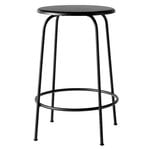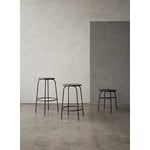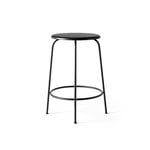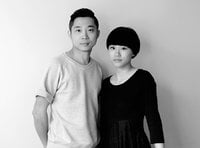Audo Copenhagen’s classical Afteroom counter stool is a tribute to functionalism and the Bauhaus style, where form always follows function. Designed and named by the design office Afteroom, Afteroom counter stool has a well-thought design: the four slim legs and round details make the chair practical without forgetting comfort. The contrast between wood and metal brings an interesting edge to the chair and makes it a convenient and durable companion for all kinds of kitchen counters and bar tables.




Afteroom counter stool, black
Audo Copenhagen
Description
Audo Copenhagen’s classical Afteroom counter stool is a tribute to functionalism and the Bauhaus style, where form always follows function. Designed and named by the design office Afteroom, Afteroom counter stool has a well-thought design: the four slim legs and round details make the chair practical without forgetting comfort. The contrast between wood and metal brings an interesting edge to the chair and makes it a convenient and durable companion for all kinds of kitchen counters and bar tables.
Product details (6)
- Colour
- Black
- Height
- 63.5 cm
- Diameter
- 45.5 cm
- Seat height
- 63.5 cm
- Frame material
- Powder coated steel
- Seat material
- Painted MDF board
- Product ID
Designer
The Stockholm-based design studio Afteroom was established by the designers Hung-Ming Chenin and Chen-Yen Wein. In their design process Afterroom is an advocate for time: the aim is to create products that are beautiful, timelessly trendy, and grow their value throughout time - products that we want to grow old together with. The designers get their inspiration from forms, senses, balance, materials and culture. Afteroom believes in the simplicity and honesty of design.
View all productsReviews (2)
3.5
Based on 2 reviews
-
L
Laurence P
Bages, France
Très beau design
341 days ago
-
M
Mélanie T
Châteaudun, France
Je ne suis toujours pas livrée de ma commande
370 days ago
Sustainability
The Product Sustainability Framework, our criteria of sustainable design, helps you find the most sustainable products in our selection. Read below which sustainability criteria this product has met.
Working conditions & labour 7/9
-
Equal opportunities for all employees
-
Commitment to UN Global Compact, fair compensation for all employees
-
Corporate responsibility requirements defined and communicated for suppliers
-
Systematic work for improved inclusion and well-being in the workplace
-
Transparent supply chain
-
Suppliers' compliance to a code of conduct ensured
-
Compliance to the UN Guiding Principles on Business and Human Rights ensured in the supply chain
-
Direct suppliers audited and certified
-
Support for community involvement in the supply chain
Eco-friendly production 8/9
-
Fair and resource-wise water-use in production
-
No incineration or landfilling of returned items
-
No use of endangered species as materials
-
No direct environmental emissions or waste (excl. GHGs) from production
-
The sustainability of direct suppliers' production is addressed and monitored
-
Production and material sourcing that respect biodiversity, animal rights, and natural ecosystems
-
Material-efficient and ecological packaging
-
No potentially harmful chemicals used in own production
-
Positive impact on nature’s well-being through operations that regenerate natural ecosystems
Climate impact 4/8
-
Company's direct greenhouse gas emissions identified and commitment to reduction
-
Product's carbon impact identified and commitment to reduction
-
Guidance on energy- and eco-efficient use of the product
-
Carbon footprint of the product calculated and goals set to reduce it
-
Contribution to climate initiatives beyond the brand’s direct operations
-
Low-carbon or compensated transportation
-
100 % renewable energy in own production and operations
-
Carbon neutral or carbon negative product
Sustainable materials 6/6
-
Sustainable and long-lasting material choices
-
No harmful or hazardous substances
-
Responsible raw material sourcing and production
-
Materials suited for circularity: monomaterials, recyclable finishings, renewable or recycled contents etc.
-
Ecological materials: natural, biodegradable, recyclable or recycled contents
-
Outstanding materials in terms of innovativeness, responsibility, sustainability and circularity: local production or sourcing, 100 % recycled content, C2C-certification etc.
Circular design 4/5
-
High aesthetic quality promoting long-term use of the product
-
Technically durable product design and material choices
-
Design for enduring life-long quality
-
Design and support for product maintenance, repair and upgradability
-
Innovative circular design solutions: circular service system, resale platform, remanufacturing, collection of used products, etc.





